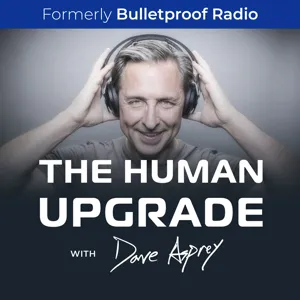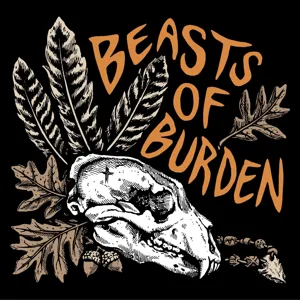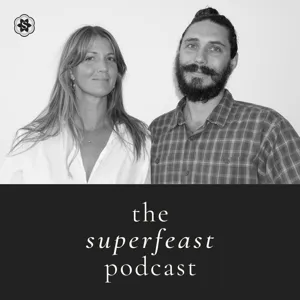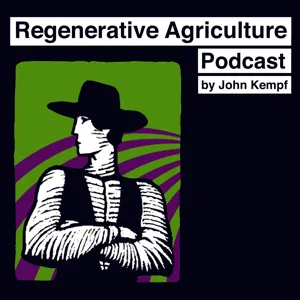Podcast Summary
A tribute to Dr. Tom Volk's mycology podcast appearance: Dr. Tom Volk's podcast episode on Ologies left a lasting impact on the host, showcasing his expertise, charm, and dedication to the world of mycology.
The life and work of mycologist, Dr. Tom Volk, who passed away in 2022, is worth celebrating through his podcast appearance on Ologies. This beloved guest, known for his charm and expertise in fungi, left a lasting impact on the host, Alle Ward, who had been saving this episode for a special occasion. The episode, first aired in 2019, provides insights into the world of mycology, covering topics from the origins of the word to various types of mushrooms and their uses. Dr. Volk's passion for fungi is evident through his extensive research, teaching, and web presence. His impact on the field and on Alle's personal growth is a testament to his charisma and dedication. Listen to or revisit this episode as a tribute to Dr. Tom Volk and his contributions to the world of mycology.
Discovering the Unique Kingdom of Fungi: Fungi, with distinct cell walls and closer animal relation, have 5.1M species, including edible and poisonous varieties. Mycology offers free food but demands expertise. Fungi play vital roles in ecosystems, absorb nutrients via hyphae networks.
Fungi, which are neither plants nor animals, form their own unique kingdom due to their distinct cell walls made of chitin and their closer relation to animals than plants. Fungi, including mushrooms, have an estimated 5.1 million species, and while some are edible delicacies, others can be dangerous or even deadly. The study of fungi, or mycology, can lead to free food foraging, but it requires extensive knowledge to avoid poisonous species. Fungi are diverse and can be found in various environments, from soil to wood, and they play crucial roles in ecosystems. For example, they help break down dead organic matter and recycle nutrients. Additionally, fungi have flagella in some primitive forms and share 23% homology with human genes. Understanding the structure of fungi goes beyond their reproductive structures, as most of the organism exists as a network of hyphae, which are thread-like structures that grow underground and absorb nutrients.
Fungi's Unique Feeding and Digestion Methods: Fungi secrete enzymes externally to digest food and absorb nutrients, thrive in moist environments, and can live inside organisms or soil, with some being harmful to humans
Fungi have unique ways of feeding and breaking down substrates compared to organisms like humans. They secrete enzymes outside their body to digest food externally and absorb the resulting nutrients. Some fungi can even infect human brains, such as Cryptococcus, which can be fatal for individuals with compromised immune systems. Fungi can live in various environments, including in soil and inside organisms, and they thrive where there is enough moisture and heat. Contrary to popular belief, they don't necessarily need darkness to grow; instead, they often live inside things where food is abundant, with their main competition being bacteria. Additionally, some people report feeling better when following a candida overgrowth diet, which eliminates gluten, dairy, sugar, and alcohol, possibly due to various reasons.
Fungi Growth and Reproduction: Fungi grow underground, consume wood as food, produce mushrooms to release spores, and come in various shapes and sizes for survival and reproduction, with chanterelles being a popular edible choice.
Fungi, such as those found in logs, grow their hyphae and mycelium underground to consume the wood as food. When they reach the surface, they produce mushrooms as a means to release spores and reproduce. The mushroom is composed of densely packed hyphae, and spores are produced on the gills or other external structures. Fungi produce vast numbers of spores to increase the chances of survival as they are spread by wind or other means. Fungi come in various shapes and sizes, from gilled mushrooms to cup fungi, puff balls, and bracket fungi, providing a vast array of strategies for survival and reproduction. Chanterelles, with their bright orange color, distinctive smell, and lack of contaminants, are a favorite edible mushroom for many.
Enjoy mushroom foraging with respect: Mushroom foraging can be enjoyable and educational, but it's important to respect natural growth, learn from experts, and understand soil systems to identify various mushroom species.
Mushroom foraging and cataloging can be an enjoyable and educational experience, but it's important to practice good fungal decency and respect the natural growth of mushrooms. Mushroom clubs and forays are great resources for beginners to learn from experienced foragers and distinguish edible mushrooms from poisonous ones. Additionally, animals like pigs and dogs can be trained to find truffles, and their methods of dispersal can help in the search for these elusive fungi. However, it's important to note that mushroom identification can be complex, and a good understanding of soil systems, animals, and trees can be essential in the search for various mushroom species.
Fungi's Complex Role in Ecosystems and Human Culture: Fungi play a crucial role in ecosystems and have been a source of fascination and inspiration for art and culture due to their hallucinogenic properties. Current research explores their therapeutic potential for various conditions.
Fungi play a complex role in ecosystems, and understanding their relationships with plants, animals, and soil requires a holistic approach. Mycologist's study of fungi since 1978 has led him to appreciate the intricacies of the underground world, but he's still working on explaining it to others. Fungi have been a source of fascination and inspiration for art and culture, including the hallucinogenic properties of some species like the fly agaric mushroom. Reindeer, in particular, are known to consume these mushrooms and experience hallucinations. Humans have been aware of the hallucinogenic properties of mushrooms for millennia and have used them in various shamanistic rituals. Currently, research is being conducted on the therapeutic potential of psilocybin, a compound found in certain mushrooms, for treating conditions like end-of-life anxiety, PTSD, OCD, and cluster headaches. The experience of psilocybin can lead to lasting psychological changes by making new neural connections in the brain.
Psilocybin's potential mental health benefits and evolutionary purpose: Psilocybin, a compound in magic mushrooms, interacts with brain's serotonin receptors, potentially treating anxiety, depression, OCD, anorexia, and existential depression. Its illegality doesn't hinder ongoing research, especially in mental health.
Psilocybin, a compound found in certain mushrooms, has shown potential in treating various mental health conditions such as anxiety, depression, OCD, anorexia, and end-of-life existential depression and anxiety. The compound works by binding to serotonin receptors in the brain, similar to the neurotransmitter serotonin. The evolutionary purpose of this mind-altering effect is believed to be a defense mechanism against insects trying to consume the mushrooms. Psilocybin is illegal in many places, including the United States, but some countries like the Netherlands, Jamaica, and British Virgin Islands have decriminalized it. Despite its illegality, there are ongoing trials exploring its medicinal uses, particularly in mental health fields. Common shroom species are relatively easy to cultivate, but it's important to note the difference between molds, slime molds, and mildew, which are all types of fungi.
Distinguishing Fungi from Molds: Different Reproduction and Structures: Fungi and molds are distinct organisms with different modes of reproduction and structures. Fungi have complex underground networks called mycorrhizae, while molds reproduce through mitosis and simple structures.
Fungi and molds are distinct organisms with different modes of reproduction and behaviors. While mitosis allows simple molds to produce large numbers of spores cheaply and grow on various substrates, slime molds have a more complex structure and do not fit into the fungi category. Fungi and animals share a common ancestor but diverged long ago, and fungi have complex underground networks called mycorrhizae, where they form symbiotic relationships with trees and plants, exchanging nutrients. Fungi can be massive organisms, with some spanning hundreds or even thousands of acres, making them fascinating and mysterious entities.
Exploring the Fungi Kingdom: Unity and Diversity: The fungi kingdom showcases unity through common traits, yet diversity through various species and forms, including clonal organisms like aspen trees and susceptible organisms like bananas to fungal blights.
There are various interconnected concepts discussed in this conversation, including the unity and diversity within the fungi kingdom, the clonal nature of aspen trees, and the impact of fungal blights on different organisms. One intriguing aspect is that many organisms, such as aspen trees and bananas, belong to the same genus but are different species. The clonal growth of aspen trees results in a massive organism called the Pando grove, which is considered the world's largest organism. Another fascinating topic is the susceptibility of bananas to a fungus, which could lead to significant changes in the coming years. Fungal blights, including those threatening bats and bananas, are a concern due to climate change and the invasive nature of many fungal species. Killing fungi is challenging due to their size, diversity, and the close relationship between humans and fungi in medical contexts. Overall, this conversation highlights the importance and interconnectedness of various aspects of the fungi kingdom and their impact on various organisms.
Vaginal yeast infections affect many women and are challenging to treat: Though common, vaginal yeast infections are difficult to treat due to fungi's resilient cell walls and the need to target specific fungal components without harming human cholesterol.
Vaginal yeast infections are common, affecting three out of every four women at some point in their lives. These infections can be challenging to treat due to the fungi's tough cell walls and the need to target ergosterol in the fungi without affecting human cholesterol. Folk remedies may work, but systemic antifungals can have side effects. The speaker, who has a deep understanding of fungi, has been inspired by this knowledge to create a unique heart preservation box made from mushrooms and wool. Her heart transplant experience has made her appreciate the surreal nature of holding her own heart in her hands. Despite the initial shock, she has grown accustomed to it over the years. The speaker's connection to fungi and her heart transplant experience have significantly impacted her life.
Tom's Transplant Journey and Fungal Infections: Tom, a medical mycology professor, shares his personal experience of battling flesh-eating bacteria and irregular heartbeats, receiving a heart transplant, and dealing with the psychological effects and importance of hand hygiene in preventing fungal infections.
Tom, a medical mycology professor, experienced a life-changing event when he received a heart transplant after battling flesh-eating bacteria and irregular heartbeats. Post-transplant, he must take anti-rejection drugs that suppress his immune system, making him more cautious about potential fungal infections. He's now an advocate for hand hygiene and teaches medical mycology. During our conversation, we discussed various fungal infections and the importance of understanding their impact on human health. Tom shared his psychological journey, acknowledging survivor guilt but also finding peace in focusing on the important things and not letting small issues bother him. His TED talk, "A Change of Heart," further highlights his inspiring perspective on life.
Appreciating the present: Every day is precious and worth cherishing, whether it's through enjoying material possessions, interactions, or experiences. Don't wait for a supposedly better day to live fully.
Every day is good and there's no need to save things or experiences for a supposedly better day. This perspective was shared by the interviewee, who grew up during tough times and learned to appreciate the present. This attitude not only applies to material possessions but also extends to interactions and experiences. For instance, in the classroom setting, the interviewee is now more open and friendly towards students. This shift in mindset also translates to charitable giving, as the interviewee and the show make regular donations to various causes. Additionally, some fungi, like psilocybin mushrooms, react to black light, which is a natural occurrence with no known benefit to the fungus. Overall, the interviewee's story serves as a reminder to cherish the present and make the most of every day.
Fungi: The Magical Decomposers: Fungi, including glowing types, help decompose materials for other organisms, have unique names, some have medicinal properties, and studying them continues to yield new discoveries
Fungi, including those that glow, play a crucial role in the decomposition process in the environment, breaking down materials so that other organisms can use them. The naming of various mushroom species is a challenge due to the vast number of species, leading to unique and descriptive names like "wolf fart puffball" and "witch butter." Some mushrooms, like those containing psilocybin, have medicinal and psychoactive properties and have been used for thousands of years in Eastern medicine. Joining a mushroom club can help individuals identify and learn about these magical and medicinal mushrooms. It's important to note that while some mushrooms can have health benefits, others, like raw shiitake, can cause skin reactions. The study and use of fungi continue to provide new discoveries and potential applications in various fields.
Exploring the world of mushroom foraging and cultivation: Learn through friends, online resources, books, and mushroom clubs. Identify mushrooms correctly for safety, and join communities to expand knowledge.
Foraging for morels and other mushrooms requires knowledge and preparation. Jared Fransen shared stories of finding morels through friends and online resources, while Dylan Ring explained that different species grow in various ecological habitats and seasons. For those interested in growing mushrooms at home, resources like books, online communities, and mushroom clubs can be helpful. However, it's crucial to identify mushrooms correctly to ensure safety, as April Meehan emphasized, sharing stories of dog and human poisonings. Overall, the discussion highlighted the importance of knowledge and community in the world of mushroom foraging and cultivation.
Mushroom identification and plastic waste reduction: Mushroom enthusiasts seek ID books, researchers explore plastic waste breakdown potential, chicken of the woods and hen of the woods suggested as meat alternatives, new antibiotics from fungi, and inviting mushrooms to yards
There's a growing interest in both mushroom identification and the potential uses of mushrooms, particularly in the realm of plastic waste reduction. Mushroom enthusiasts, including Christie and others, are seeking recommendations for "mushy" or identification books. Meanwhile, researchers are exploring the possibility of using certain mushroom species to break down plastic waste, although more development is needed. For those who dislike the texture of mushrooms but want to incorporate them into their vegetarian diet, the chicken of the woods and hen of the woods are suggested as good substitutes due to their chicken-like texture. Additionally, there's a growing need for new antibiotics, and researchers are looking to fungi as potential sources. If you're interested in inviting mushrooms to your yard, you can spread their spores to encourage growth. However, not all mushrooms are desirable, as some create "fairy rings" that may not be ideal for lawns.
Mushrooms in Fairy Rings: Myth and Reality: Some fairy ring mushrooms are toxic, like Chlorophyllum molestans, while others, like Merasmus, are edible. Mycology professors find the study of fungi intriguing and recommend mushroom hunting as a hobby.
While fairy rings may have been believed to be inhabited by fairies in the past, some of the mushrooms growing in these rings can be toxic and even cause projectile vomiting and diarrhea. For instance, Chlorophyllum molestans is a common cause of poisoning in North America. However, not all mushrooms in fairy rings are toxic, as Merasmus, which is edible, is also common. Allergies to mushrooms are also quite common, and some people can even develop an allergy after consuming them excessively. As for the job of a mycology professor, they find the people interested in fungi to be the most interesting aspect of their work. Despite some challenges, they enjoy the hobby of mushroom hunting and recommend it to anyone. Mycology is a fascinating field with various types of people drawn to it for various reasons. If you're interested in learning more about mushrooms or even considering organ donation, you can find resources on Tom Volk's Wisconsin.edu mushroom site and Donate Life.net, respectively. Don't forget to follow Ologies on Twitter and Instagram for more scientific exploration.
The Importance of Self-Care and Personal Growth: Through personal anecdotes and tributes, this episode of Ologies emphasizes the importance of taking care of oneself, reflecting on experiences, and embracing new opportunities for personal growth.
Key takeaway from this episode of Ologies is the appreciation for the intricacies of life and the impact of various experiences on personal growth. The host shared a personal anecdote about spending more time cleaning a shower door than taking a shower, emphasizing the importance of taking care of oneself. He also paid tribute to Dr. Volk, a guest on the show who passed away, and expressed his intention to dedicate a future episode to his experience with psychoactive mushrooms, which he described as a life-changing event. The episode also highlighted the support of various individuals and organizations that make the podcast possible. Overall, the episode underscored the value of self-care, reflection, and the exploration of new experiences.






